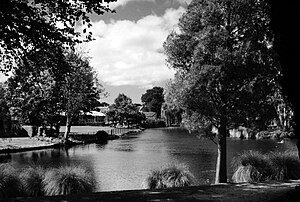Karewa
| Mona Vale | |
|---|---|

The Avon River at Mona Vale
|
|
| Type | Public park |
| Location | Christchurch |
| Coordinates | 43°31′23.89″S 172°36′30.67″E / 43.5233028°S 172.6085194°ECoordinates: 43°31′23.89″S 172°36′30.67″E / 43.5233028°S 172.6085194°E |
| Area | 4 ha |
| Created | 1899 |
| Operated by | Christchurch City Council |
| Status | Open all year |
| Official name | Mona Vale |
| Designated | 7-Apr-1983 |
| Reference no. | 283 |
| Official name | Mona Vale Gatehouse |
| Designated | 7-Apr-1983 |
| Reference no. | 1799 |
Mona Vale, with its homestead formerly known as Karewa, is a public park of 4 ha in the Christchurch suburb of Fendalton. The homestead and gate house are both listed as heritage buildings with Heritage New Zealand (NZHPT). The fernery and the rose garden, and pavilion with the setting of the park along the Avon River, add to the attractiveness of the property. It is one of the major tourist attractions of Christchurch.
The western boundary of Mona Vale is the Main North Railway, and the Avon River forms the eastern border. In the north, the park is very narrow and starts at Fendalton Road. In the south, it extends to Matai Street East and has Christchurch Girls High School as a neighbour.
The gardens cover four hectare.
The land initially belonged to the Deans brothers, whose homestead is Riccarton House in Riccarton. William Derisley Wood leased the land and built what became known as Wood's Mill. The weir in the Avon River was built in the 19th century and forms the Mona Vale mill pond, which still exists today.
Frederick Waymouth and his wife Alice purchased four acres of land and had a homestead built in 1899–1900, designed by architect Joseph Clarkson Maddison. Waymouth, who called the homestead Karewa, was the Managing Director of Canterbury Frozen Meats. Maddison was a well-known Christchurch architect, who amongst other buildings designed the freezing works in the Christchurch suburb of Belfast. It is thought that this connection between Waymouth and Maddison led to this commission.
Waymouth sold the property to Annie Quayle Townend in 1905, who renamed it to Mona Vale after her mother's house in Tasmania. She was the daughter of a wealthy Canterbury run-holder, George Moore of Glenmark Station. She was his only surviving daughter and he had bequeathed her one million pounds, apparently making her New Zealand's richest woman at the time. Townend added nine acres of land to the property and had a gate house built just off Fendalton Road. After the New Zealand International Exhibition, held in Hagley Park, finished in 1907, she purchased the exhibitions fernery including its plants and had it reassembled at Mona Vale. The present collection of ferns were supplied by Landcare Research in Lincoln, the Christchurch Botanic Gardens and the private collection of the late Arthur Ericson. Townend also added the bathhouse to the property. She died in 1914.
...
Wikipedia
